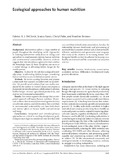Ecological approaches to human nutrition
Résumé
Background. Malnutrition affects a large number of people throughout the developing world. Approaches to reducing malnutrition rarely focus on ecology and agriculture to simultaneously improve human nutrition and environmental sustainability. However,evidence suggests that interdisciplinary approaches that combine
the knowledge bases of these disciplines can serve as a central strategy in alleviating hidden hunger for the world’s poorest.
Objective. To describe the role that ecological knowledge plays in alleviating hidden hunger, considering human nutrition as an overlooked ecosystem service.
Methods. We review existing literature and propose a framework that expands on earlier work on econutrition. We provide novel evidence from case studies conducted by the authors in western Kenya and propose a framework for interdisciplinary collaboration to alleviate hidden hunger, increase agricultural productivity, and
improve environmental sustainability.
Results. Our review supports the concept that an integrated approach will impact human nutrition. We provide evidence that increased functional agrobiodiversity can alleviate anemia, and interventions that contribute to environmental sustainability can have both direct and indirect effects on human health and nutritional well-being.
Conclusions. Integrated and interdisciplinary
approaches are critical to reaching development goals. Ecologists must begin to consider not only how their field
Collections
- Publicaciones y documentos [4421]


